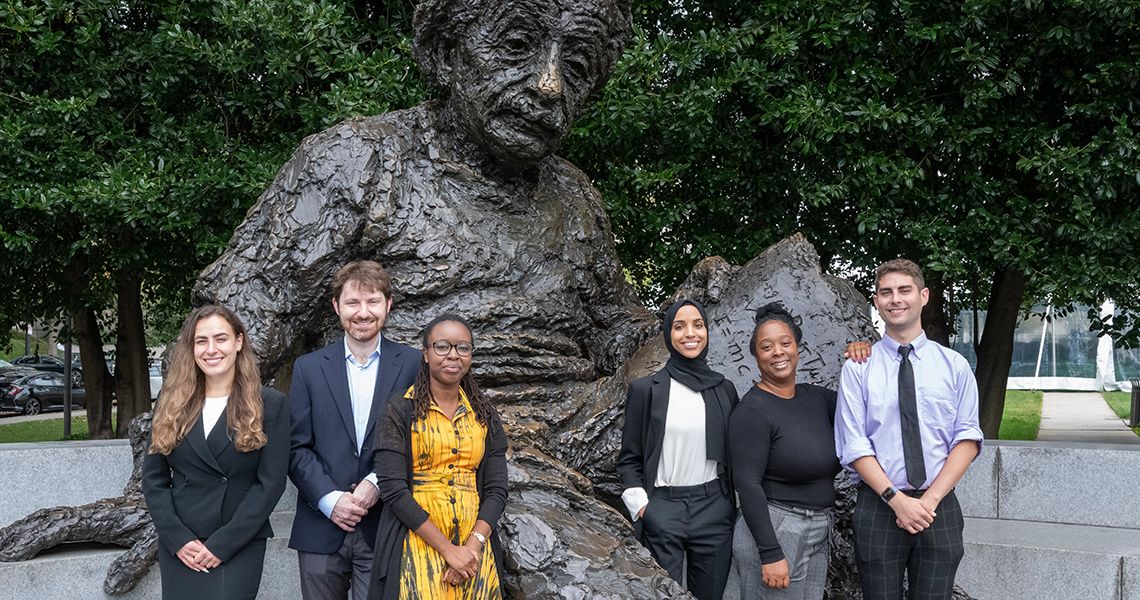A multi-disciplinary group of students from three schools at the George Washington University (GW) beat out six other competing teams from D.C.-area universities to win the 2023 Grand Prize of the 10th annual D.C. Public Health Case Challenge on Oct. 6, 2023.
The annual challenge is co-sponsored by the National Academy of Medicine’s Kellogg Health of the Public Fund and the National Academies of Sciences, Engineering, and Medicine’s Roundtable on Population Health Improvement, with support from the Global Forum on Innovation in Health Professional Education. The competition, launched in 2013, supports interdisciplinary, problem-based learning around a public health issue of importance to the Washington, D.C., community.
This year’s challenge explored broad-based, population-level preventive options in response to this year’s theme, “A Public Health Approach to Improve the Health of Women Experiencing Homelessness in D.C.” Teams are judged on the interdisciplinary nature of their proposal, as well as the feasibility, creativity, and practicality of implementation.
The GW team included students representing all three of GW’s health care related schools — second-year PA student Fatima Elgarguri, and fourth-year MD student Nick Jennings, from the GW School of Medicine and Health Sciences (SMHS); Shawn Bayrd and Wendy Post, from the School of Nursing; Anna Hochberg, and Soukeyna Sylla, from the Milken Institute School of Public Health at GW (Milken SPH). Their winning proposal, titled “Washington Public Health Collaborative,” sought to reduce mental health issues among LGBTQ young women (age 18 to 24 years) experiencing homelessness.
Teams had two weeks to develop a solution addressing the theme and using a set of issue parameters including a hypothetical $1 million budget over a two-year span. The teams presented their proposals to a panel of expert judges who evaluated the interdisciplinary nature of the recommendation, as well as their feasibility, creativity, and practicality.
The GW team focused on addressing mental health and shelter safety, given the evidence indicating that LGBTQ+ individuals face greater threats to their personal safety than non-LGBTQ individuals. Their plan included delivering bystander intervention training to shelter staff and residents, and use of a Discord server to create and maintain a safe space for community-building and sharing of resources and personal experiences among LGBTQ+ youth.
“The most valuable part of this experience for me was the multidisciplinary team exposure,” said Elgarguri, who is pursuing a joint-degree PA/MPH. “This is what attracted me the most to the project. When it comes to studying and practicing medicine, it’s so easy to get caught up in the biomedical perspective. I am very intentional about not wanting to lose the bigger picture. Working with people from different backgrounds was the perfect way to break out of my medical ‘bubble.’ ”
Working on multidisciplinary teams with varied backgrounds and perspectives to develop effective public health strategies is what the National Academies of Sciences, Engineering, and Medicine (NASEM) intended when the organization developed the problem-based learning competition a decade ago. Nationally, medical education is moving to incorporate more clinical public health subject matter into the curriculum according to Karla Bartholomew, PhD, JD, MPH, PA, associate dean for clinical public health and director of the dual-degree MD/MPH program at SMHS.
“Given its explicit incorporation of the socio-ecological model, upstream factors, and interdisciplinary approaches, NASEM’s Public Health Case Challenge underscores the importance of our SMHS Clinical Public Health education and its role in preparing students to be 21st century clinicians. The expanded scope of practice in health care today draws on population health principles and skills to promote the health of individuals and their communities,” said Bartholomew, who served as lead faculty advisor for the team along, with Milken SPH faculty members Gene Migliaccio, DrPH, associate dean for applied public health, and Jennifer Skillicorn, DrPH, director of the Office of Applied Public Health.
“Those are some of the central tenets of clinical public health that I think are very much where medical education and that health systems are moving,” Bartholomew added.



